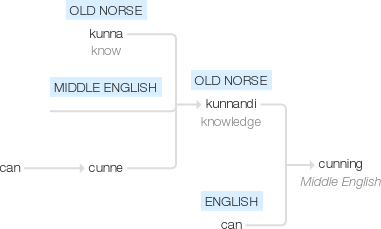Cunning
Middle English: perhaps from Old Norse kunnandi ‘knowledge’, from kunna ‘know’ (related to can1), or perhaps from Middle English cunne, an obsolete variant of can1. The original sense was ‘(possessing) erudition or skill’ and had no implication of deceit; the sense ‘deceitfulness’ dates from late Middle English.
wiktionary
From Middle English cunning, kunning, konnyng, alteration of earlier Middle English cunninde, kunnende, cunnand, from Old English cunnende, present participle of cunnan(“to know how to, be able to”), equivalent to con + -ing. Cognate with Scots cunnand(“cunning”), German könnend(“able to do”), Icelandic kunnandi(“cunning”). More at con, can.
From Middle English cunning, kunnyng, partially from Old English *cunning(verbal noun), from Old English cunnan(“to know how to, be able to”); partially from Old English cunnung(“knowledge, trial, probation, experience, contact, carnal knowledge”), from cunnian(“to search into, try, test, seek for, explore, investigate, experience, have experience of, to make trial of, know”), equivalent to con + -ing.
etymonline
cunning (adj.)
early 14c., conning, "learned, skillful, possessing knowledge," present participle of connen, cunnen "to know," from Old English cunnan (see can (v.1)), from PIE root *gno- "to know." Also compare cun (v.). Sense of "skillfully deceitful, characterized by crafty ingenuity" is probably by late 14c. Related: Cunningly.
cunning (n.)
c. 1300, conninge, "knowledge, understanding, information, learning," a sense now obsolete, verbal noun from connen, cunnen "to have ability or capacity," from Old English cunnan (see can v.1). By mid-14c. as "ability to understand, intelligence; wisdom, prudence;" sense of "cleverness, shrewdness, practical skill in a secret or crafty manner" is by late 14c.
